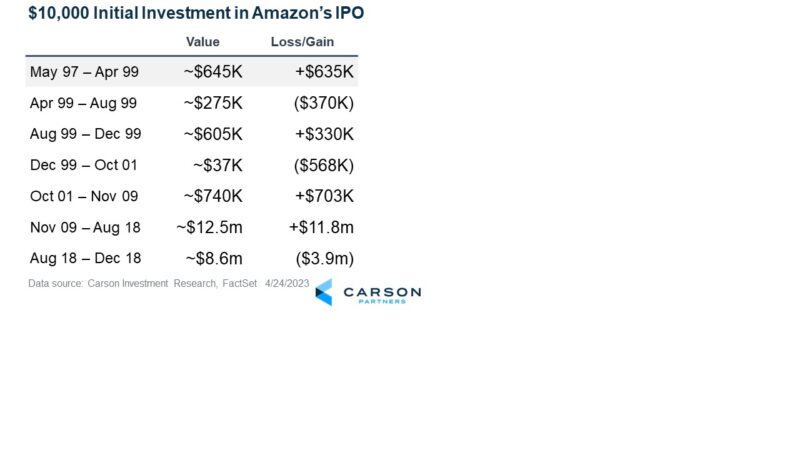Carson Investment Research recently published our 8 Principles of Equities. Our 4th principle is one of the most profitable yet difficult disciplines to master – patience & perspective pays. The stock market is a reflection of human emotion. It can bring joy and pain, fear and hope, pride and shame, anger, and comfort. Staying grounded and managing these inevitable emotions are key to compounding wealth over the long term, which of course, takes a long time.
We’ve all seen the “if you invested $10,0000 in this stock at its IPO, it would be worth $X millions” right? However, what these stats don’t show is how difficult that truly is. As a stock gains in value, so do the stakes. Take Amazon, for example. That stock came public in 1997 at a split-adjusted price of roughly 8¢ per share. If someone invested $10,000, they would have received about 125,000 shares that would be worth over $13 million today! However, what most don’t appreciate is the emotional rollercoaster that was required to achieve this wealth.
From its IPO to 1999, our hypothetical Amazon investor was feeling pretty good. E-commerce was taking off, and Amazon was going to be a major beneficiary with enormous potential. Then there was a major correction that occurred from around April 1999 through August that year where the stock was roughly halved. Ok, corrections happen. Losing about $370K over the course of a few months hurts, but our investor still believes in the company’s vision. Maybe they wished they would have trimmed a little near those previous highs, but they’re in it for the long term..

Stay on Top of Market Trends
The Carson Investment Research newsletter offers up-to-date market news, analysis and insights. Subscribe today!
"*" indicates required fields
From August 1999 to December that year, the stock more than doubles. Our investor is feeling really smart about their conviction in the long-term vision of Jeff Bezos. Maybe they even wished they added to their position near the lows. Then the dot-com bubble starts to collapse. Amazon’s stock price tanks from over $5 to 30¢ by October 2001. There’s concern from Wall Street about the company’s solvency and emerging competition. Our investor has seen their investment drop by over 90% from its peak – or a loss in excess of $600K. They are surely filled with regret. Why didn’t I take some off the table? Imagine what I could have done with those gains? Should I listen to the experts and sell what’s left? I still have a gain but what was I thinking? Maybe investing isn’t for me.
Amazon is an extreme example due to the stock’s high volatility, but all investors have experienced these emotions. It’s imperative to have a plan and an advisor to provide assistance in managing these feelings. We’re often our own worst enemy, and that’s certainly true when it comes to investing. Patience and perspective pays in life but especially in the stock market.



